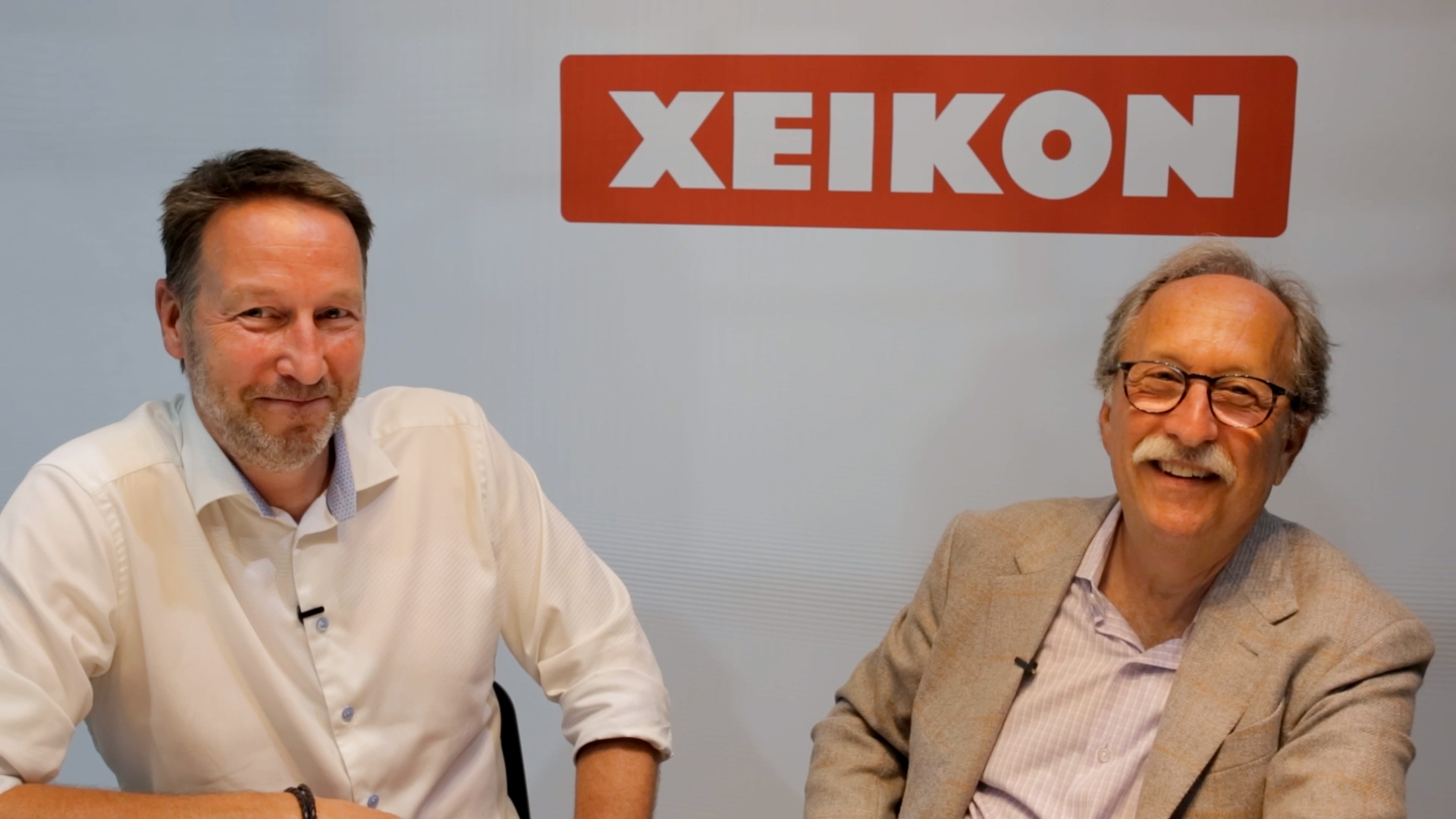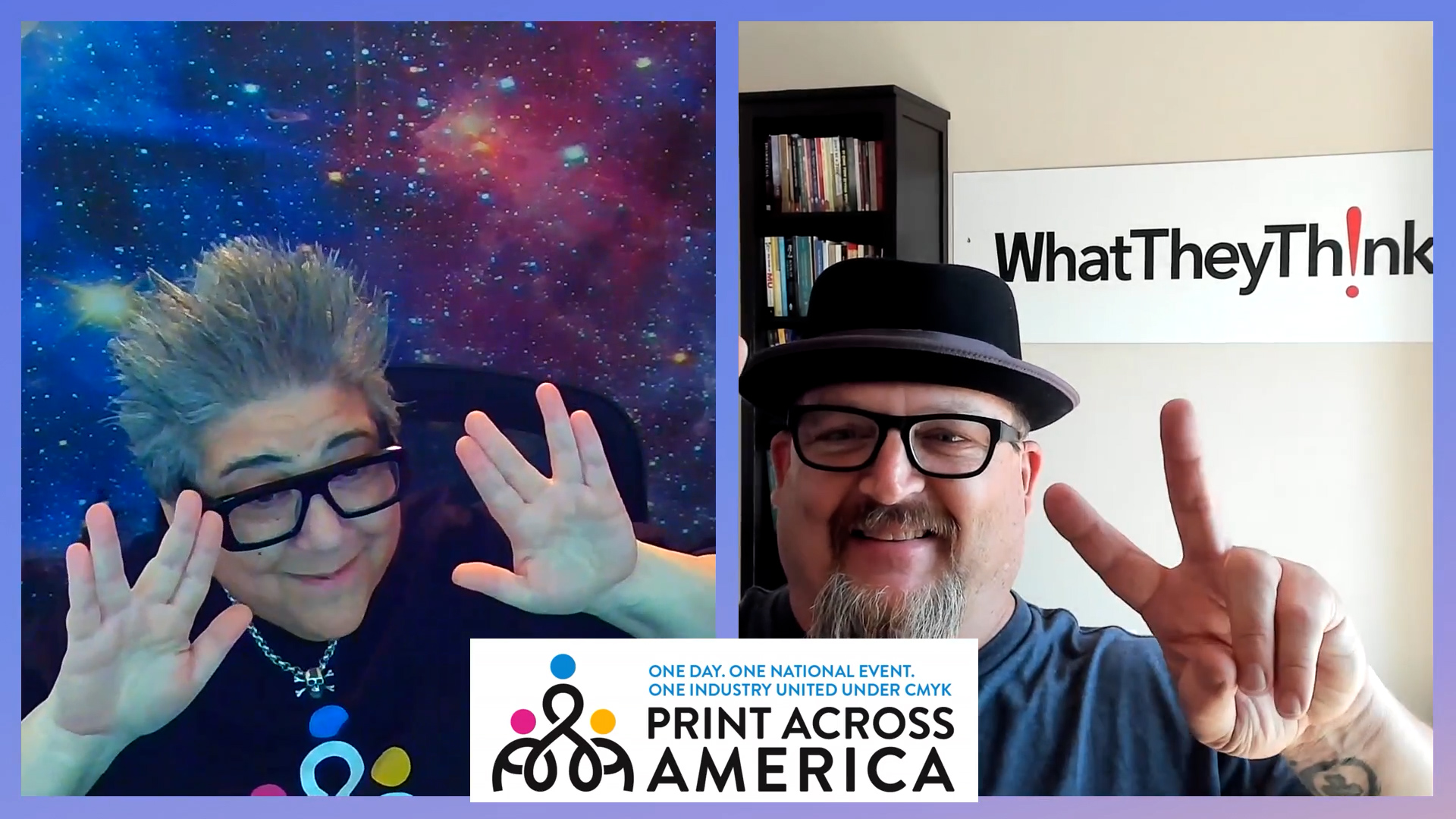Commentary & Analysis
Displaying 3601-3700 of thousands of articles
Insight You Need. Analysis You Trust.
Get the trusted insights you need to understand our evolving industry and emerging trends. Become a Premium Member.
Harte Hanks Leverages Technology and Direct Mail in the Multi-Channel Customer Journey
As marketers seek techniques to create effective direct mail, technologies like high-speed, full-color inkjet are creating opportunities to produce personalized and customized direct mail items that will truly capture consumers’ attention. This article explores how Harte Hanks has leveraged advanced digital printing capabilities to effectively deliver targeted, personalized direct mail touches that weave seamlessly into the multi-channel customer journey.
S&P 500 Revenue Per Share Still Lags Economy
Everyone knows that the stock market is up from its lows at the bottom of the recession,but one obscure but key measure underscores how sluggish the economy has been. The S&P 500 should have a bias of steadily increasing revenues. It has most of the best companies in the world, with international presence in the globe's growing markets and a foundation in the established ones. It is rare for companies to be dismissed from the S&P 500, but companies are added all the time. When S&P companies merge, they create a new entity of combined revenues, and another company is added with new revenues to add to the index. The other upward bias should be the high level of stock buybacks buy these large companies, as they borrow money at low interest rates and create “shareholder value” by reducing the number of shares and increasing the value of each share of stock. We've called this cowardly, as it increases earnings per share (EPS) without needing to increase total profits. So this revenue per share should be steadily increasing with a growing economy in a recovery that started in mid-2009. It seems that companies have done a much better job of financial engineering than they have in creating revenues.
Growing a Modern Print Business: Sales versus Marketing
Growing your business is more about marketing than it is about hiring more sales people today. The sales cycle is moving online where good marketing programs can nurture prospects from initial inquiry to paying customer.
"Best Dscoop Ever!"
This is the refrain Senior Editor Cary Sherburne heard over and over again during and after Dscoop 11, held in San Antonio TX. The conference attracted double the number of companies as compared to last year and featured outstanding keynotes, content and activities.
Inkjet drupa 2016 – Continuing the Story – Kodak Enterprise Inkjet Systems
In this article, David looks at current and future state of Kodak Enterprise Inkjet Systems Division (EISD), the Stream and ULTRASTREAM Technologies as well as PROSPER products and future technologies.
Personalized Packaging is Here
For printers and packaging converters looking to take advantage of the market opportunities offered by customized or personalized packaging, the Zoxxbox story is an interesting one. Learn how the company is leveraging digital tools to make customized packaging an affordable reality in this article sponsored by XMPie.
ISA Sign Expo: Beyond Signage
If the ISA Sign Expo 2016 demonstrated one thing—and it demonstrated far more than one thing—it was that “signage” is part of a much larger graphic ecosystem than can include products and applications seemingly far-removed from signs.
Less Gets More, Models and Supermodels, and Why True and False Should Add Up
The latest government data show fewer commercial printing establishments, fewer employees, but higher pay. Now that more economic data are negative, we should really know if forecasting models economists use make any sense beyond predicting the past. Many of those models use spreadsheet software, and some programs can't make what's true and what's false add up. Yes it's a Dr. Joe potpourri.
Inkjet Summit 2016: The Market is on the Move!
Now in its fourth year, nGage’s 2016 Inkjet Summit (April 18-20) focused on critical trends and new applications in direct mail, book publishing, commercial printing, and transactional printing. This article provides a brief history of the event and also discusses some of the highlights from this year.
At Last, Nano Is Now as Landa Nanographic Printing Presses Line up for Market Entry
The wait has been long, and the anticipation has been intense. But, Landa Digital Printing believes it can amply reward both with what it will debut at drupa 2016.
NFIB Small Business Index: A New Recession for Main Street?
Economic data have been conflicting of late, but there is one consensus in the data that is clear: the small business economy did not recover from recession, and looks like it’s back in recession territory. There are many indicators we use for small business but one that is watched often is that of the NFIB. It is published monthly and has a long history. US government data focuses attention on the largest businesses because they represent big chunks of the economy and report some kind of data, especially payroll data, with great frequency. Think of it as counting whales rather than minnows. Their recent analysis said “The small business sector... is underperforming, doing little more than operating in maintenance mode. Slow economic growth is now just a result of population growth, more haircuts, retail customers, health care patients, etc. But there is no exuberance, no optimism and not much hope, the numbers make it clear.” Economies stuck in +2% growth mode tend to do that.
The Patent Trolls Lose and the “Good Guys” Win One – The HQPI Cases Dismissed
In one of the latest and most visible cases, High Quality Printing Innovations (HQPI) a shell company, under the troll company of Modern Universal Printing, LLC v. numerous print service providers and OEMs, all of the lawsuits were dismissed.
The Trapped Data of the Print Industry
The print industry’s technology is too closed, too proprietary, making it overly difficult for print businesses (the entities that make this whole ecosystem work) to access, use, distribute, and learn from the data their business’ generate every day. If we keep at this, we will choke off the only thing that matters (growing print businesses).
2014 US Commercial Printing Capital Expenditures: New Purchases Down, Used Purchases Up
The US Department of Commerce recently released its Annual Survey of Manufactures Capital Expenditures report, issuing data for 2014.
HP Previews Extensive Catalog of Print Innovations for drupa 2016 (Part II)
HP’s sense of itself as a change agent for digital printing is strong. The very broad range of digital solutions it will show at drupa 2016 befits the size of its ambition.
New Avenues of Success: Landaal Packaging Systems Thrives On Adversity
When the auto industry crashed and burned in 2007–2008, and their biggest client pulled most of their business, Michigan’s Landaal Packaging Systems saw an opportunity to reinvent itself with digital wide-format printing.
Inkjet drupa 2016 – Continuing the Story – HP Indigo
In this article, David looks at HP Indigo, the technology, and what we can expect from them at drupa 2016. Even though Indigo is not inkjet, there will be a number of new products at drupa and it is worth covering in these series.
Print: Changing the Customer Experience with Augmented Reality
Motivated by an increasingly sophisticated range of online and offline shopping opportunities, consumers are eager to experience higher-quality shopping experiences. Retailers can delight their customers by providing an experience that is relevant, personalized, and engaging. This article provides examples of augmented reality applications that are designed to deliver much more effective and engaging communications
The Fed Never Really Stopped QE3
This week’s chart shows the aggressive actions of the Federal Reserve after the housing bubble. For decades, the Fed’s balance sheet increased by about 6% per year, averaging about half inflation and half economic growth. The rocket-like rise when the bubble burst is clear, and then the three steps up of each of the quantitative easings are plainly seen. The Fed has wanted to raise rates for some time, but they have also wanted to stop the buying of government instruments that characterized the QE programs. They create shortages of publicly traded bonds which increases their prices, which makes the effective interest rates low. Rather than ending their purchases, the Fed has been replacing matured obligations. In effect, this keeps QE3 going. Can the Fed ever end it? They may hold on and hope that over time that economic growth and inflation catches up to them in time, but that can take forever, or perhaps longer. It will be difficult for the Fed to end its policy without robust economic growth that will give them the flexibility and opportunities to unwind their holdings. Should a recession begin, or a new financial crisis emerge (even an internationally) the Fed might need to create an additional QE effort.
ESKO: Driving Change in Flexo
At a pre-drupa briefing last month, duomedia hosted a large crowd of press and analysts from around the world to hear from eight different companies about their drupa plans and general strategies. This article includes links to other WhatTheyThink reporting on these announcements as well as a focus on the announcements made by the Danaher family of companies including Esko, Enfocus, X-Rite and Pantone. This included a flexo platemaking breakthrough announced by Esko that is set to create a shift in that market.
Web-to-Print Product Spotlight: Infigo
Technology decisions can be costly, not just in licensing/subscription fees but in the time and effort it takes your team to implement, learn, and launch technologies to your customers. One of the aspects of the Infigo product suite is the ability to add modules as you continue to diversify.
Inkjet drupa 2016 – Continuing the Story – HP PageWide, Corrugated, and PageWide HD
In this article, David looks at HP, and its drupa 2016 introductions of the PageWide Corrugated and HD production inkjet presses.
Justice Department Saves Newspapers (really?)
March 2016 – Mergers, Acquisitions & Restructuring in the Printing, Packaging & Related Industries
USPS, Shiny Objects, Recovery, and Recession
The USPS exigent price increase has expired, and USPS says they “will lose approximately $2 billion in annual revenue resulting from a price reduction” which they knew was going to expire. The increase was to help “recover for the massive volume and revenue losses resulting from the Great Recession.” Yet, Dr. Joe shows that the declines in USPS volume kept declining after the economic recovery began in mid-2009. Then Dr. Joe talks about recession in light of recent economic data. Yeah, they’ll be calling him Dr. Doom again.
Personalization: The Missing Link
Today’s consumers have grown comfortable with the ideal of establishing a one-on-one dialogue with marketers, and many consumers have come to expect this level of intimacy. This article cites recent research to explore consumers’ practices and preferences when interacting with direct mail and other types of content.
Peer Collaboration and the Optimization of Print Software
Find peers to collaborate with at all levels of your company. When your web-to-print person gets stuck, they should have life-lines to other printers who have the same technology. Don’t rely solely on the vendor. Industry events are the best places to meet peers who share your challenges.
Can USPS Price Increase Rollback Get EDDM Moving Again?
The USPS is always in the news, and last month's Annual Compliance Determination report was not particularly positive. “The majority of products failed to meet service performance targets for FY 2015” read the Postal Regulatory Commission press release. The PRC directed “the Postal Service to improve service performance and provide a comprehensive plan within 90 days.”
HP Previews Extensive Catalog of Print Innovations for drupa 2016
If you are planning to attend drupa 2016, make sure your agenda gives you plenty of time to review what HP will be bringing to Hall 17. There is going to be a great deal to see.
Twenty-one Months of Consecutive Increases for US Commercial Printing Shipments
The US Department of Commerce issued its latest report of US commercial printing shipments (NAICS 323) and the data show 21 consecutive months of positive comparisons to the prior year current dollar shipments. The trend started with June 2014, and has been an average increase of +3.3%, +$225 million per month, for that period.
Recovery Indicators Say “Recession? Don't Know the Word”
We may have gone through the first six week recession in history. That's said a bit tongue-in-cheeck, but many of the economic measures seem to have bottomed or are in the process of doing so. Besides that, recessions are measured in quarters, not weeks. The doom of the global economic slowdown and the worldwide currency crises seems to have left with a whimper.
How Labels and Packaging Can “Touch the Future”: an Interview with drupa’s Sabine Geldermann
A decision to attend drupa 2016 represents a major investment of time and travel expense. The director of the global event talks about why label and packaging producers are among those who should most seriously consider making it.
Zazzle: A Modern Success Story
Senior Editor Cary Sherburne has been a long-time customer of Zazzle and was thrilled with the recent opportunity to visit the company’s manufacturing sites in San Jose CA. Learn more about the successful business this unique company has built in this article sponsored by HP.
Landa and the Soul of a New Machine
Landa has announced that its lineup of Nanographic Printing presses at Drupa will include sheetfed presses running at 13,000 B1 sheets per hour as well as one meter-wide (41 in.) web presses printing on plastic packaging films. The company will also unveil Landa Nano-Metallography, a zero-waste metallization technology that will halve the cost of metallized printing compared to foil transfer processes.
Sustainability and Wide-Format—It’s Not Just About Substrates
SGIA’s Marci Kinter offers a comprehensive set of environmental sustainability tips and strategies that go beyond merely choosing the right substrate.
Pii: Making Data-Driven Marketing Work
The concept of creating relevant communication is becoming table stakes, and marketers with the most targeted strategies will be the ones that win. This article cites recent research from InfoTrends and explores how pii is stepping up to the data challenge.
Inkjet drupa 2016 – Continuing the Story – Part 2: More on Nanography, Metallization
In Part Two of this two-part article, David continues his review of Landa, the Nanographic Printing technology, and additional new development and offerings in preparation for drupa 2016.
Printing Profits Rebound (A Little)
Profits bounced back from a terrible third quarter which had an industry-aggregate loss of -2.57% as a percentage of revenues, and went back up to a more reasonable 4.38%. The difference was the massive writedowns of the third quarter which resulted in a -10.97% loss in printing companies with more than $25 million in assets.
Third Look at 4Q-2015 GDP Revised Up, Atlanta Fed Q1-2016 GDP Estimate Plummets
In a clear case of dealing with a two-handed economist when asked about economic conditions, the Bureau of Economic Analysis increased their estimate of fourth quarter GDP to +1.4%. The initial report was +0.7%, and then it was revised to +1.0%, and now it is +1.4%. They were off only by $100 billion from the first report, greater than the size of the printing industry, just to add some perspective about how big the US economy is.
Don’t Try and Train Your Customers
Your customers don’t want to be trained, your customers want you to make them look good in front of their boss, get them promoted, and generally make their lives easier. Don’t try and educate your customers, sell them on what’s in it for them if they adjust their behaviors (e.g. use your web-to-print system, submit print-ready PDF files, etc.)
Inkjet drupa 2016 – Continuing the Story - Landa
In this two-part article, David looks at Landa, the Nanographic Printing® technology, including additional new developments and offerings in preparation for drupa 2016.
The Signs Are Good for Next Month’s ISA Sign Expo
Sign Expo 2016 comes to Orlando, with four days of educational sessions, keynotes, and a packed exhibition hall. As an added bonus, both Roland’s ImagiNATION 2016 and Durst’s Retail 2020 are colocated with this year’s Sign Expo.
In Case You Missed It… Millennials are an Emerging Consumer Powerhouse!
This past week, Quad/Graphics released a study entitled Millennials: An Emerging Consumer Powerhouse. One of the key areas of focus was how printed materials are used by today’s “connected” generation of Millennials. This article provides an overview of how Millennials interact with printed media.
Updated Commercial Printing Forecasts to 2021
Now that 2015 data are complete, we have run the forecasting models again and present them in this chart.
Print Production Workflow Automation
One workflow for all job types results in wasted labor, unrealized profits, and slower turnaround times. The modern print business has to drive automation by creating different routes for different job types. The approach has to be strategic, because automation in one area can create congestion in another.
Nielsen Measures Ad Trustworthiness, Finding Much in Traditional Media
Now, what was it you wanted to sell me? If the format of your advertising pitch is one that inspires confidence and trust, we may be able to do business.
Heidelberg Promises to Look “Smart” at drupa 2016 (Part II)
The company finally has made a full commitment to digital, most notably with the coming launch of a B1 inkjet press. But conventional production will still anchor its presence at the show.
Inkjet drupa 2016 – Continuing the Story - Xeikon
In this article, David looks at Xeikon, its new Trillium Liquid Toner technology and press, as well as its latest offerings in preparation for drupa 2016.
The Role of Print in the Media Mix and Shifting Economic Perspectives
Outsell, Inc., those folks who got our industry's attention by saying “print can be a legitimate spinoff from the Web,” are out with their latest estimates of media spending for 2016. Their latest data should make print owners and executives take notice because they offer a view into the problems that communications decision-makers face, and we're all about solving problems, aren't we. Dr. Joe adds his commentary to theirs and his insights into some of the latest economics news.
Xerox Previews New Inkjet and iGen Offerings at Pre-drupa Event
A new iGen, new production inkjet models, and software solutions were pre-announced to Xerox customers and the media at a special event held last week at the Gil Hatch Center in upstate New York.
Marketing to Millennials: Will Printed Direct Mail and Catalogs Work?
Born between the early 1980s through about 2000, Millennials are a highly connected audience who don’t know a world without personal computers and mobile devices. This article cites recent research from InfoTrends to explore how tried and true direct mail campaigns can still be highly effective within this diverse generation.
Advertising Agency Revenues Have Major Revision Down for 2013 & 2014, but Remain in Long-term Uptrend
The US Department of Commerce released its latest Quarterly Service Survey last week, and it reduced shipments for the third quarter of 2013 by -$4 billion (whoops – a -15% statistical error).
Making Web-to-Print Part of Your Culture
Web-to-print is a strategic initiative that creates two service level paths through your organization; self-service and full-service. Your leadership is the key ingredient required for success.
Digital Package Printing As an Innovation Tool for Consumer Brands: an Interview with Mike Ferrari
Digital printing is no longer a tangential technology for packaging—it’s a mainstream process for brands that want to stay fully engaged with consumers. An authority on brand management explains why.
A Closer Look at Digital Dye-Sublimation Printing
There are a number of different printing technologies used to print fabrics and textiles. One of the most common—and the one that is getting the most attention these days—is dye sublimation. What is dye sublimation printing, and what do you need to take advantage of the technology?
Marketing Attribution: Building the Case for Print
Marketing attribution is the science of determining what channels are driving desired actions and assigning them appropriate credit. Print is an important channel in the marketing mix. This article highlights recent InfoTrends’ research that attributes the value of print in the mix.
Cold Front Moves In – February 2016 M&A Activity
February 2016 – Mergers, Acquisitions & Restructuring in the Printing, Packaging & Related Industries.
Is the Positive Run for Commercial Printing Coming to a Close?
The latest printing shipments were discussed in the “Mondays with Dr. Joe” of March 7. The chart offers more details. Revenues turned around on a current dollar basis with June 2014 shipments (blue line) and the positive comparisons to the prior year kept going until the most recent report, January 2016. In current dollars, January’s shipments were barely above those of 2015, keeping the positive comparison streak intact.
National Print Owners Association Successfully Enters Post-Startup Phase
Starting a trade association isn’t the same thing as establishing a trade association. Giving it a base for an extended life of service to its members requires long-range planning and determined execution. This is the story of NPOA.
Marketing Your Print Business
As we move more business online, utilize digital communication channels, and look to diversify – our print business marketing becomes more critical to our overall business success.
The Printing Industry and Patent Trolls – An Update on the CTP and HQPI Patent Infringement Litigation Cases and their Negative Impact on Industry’s Companies
At a time when the printing industry is searching for new growth and development opportunities, it now faces new obstacles: patent trolls, the epitome of greed, thoughtlessness, and unethical behavior impacting the survival, growth, and development of printing and related companies.
Heidelberg Promises to Look “Smart” at drupa 2016 (Part I)
As the event nears, Heidelberg wants to be seen in a different light: less dependent on equipment, more open to partnership, wholly focused on production efficiency.
Textile Printing 101
Digital textile printing is seemingly everywhere, and many sources tout it as a high growth area. New product announcements are also coming thick and fast. But what are the basics of digital textile printing? This week, we offer a basic primer on the topic.
Economic Data: It's Okay to be Less Worried
The recovery indicators bounced back from a scary month. Printing shipments beat out a weak grounder to keep their winning streak alive, unless the statisticians call it an error. And how does that relate to employment? Dr. Joe explains that, negative interest rates, adds his constant tirade against buybacks, and tells us not to get caught up in that saw about half of people not paying taxes. What can we say? It's Dr. Joe. You know how he gets.
2016: It’s All in the Data!
Communicating with the right audience at the right time is not about capturing more data, but about capturing data that can drive better business decisions. This article highlights recent research and also includes quotes from industry experts to illuminate the importance of high-quality data.
Another New Business for EFI
EFI is using both organic growth and acquisitions to get to CEO Guy Gecht’s much publicized goal of reaching $1 billion in revenue this year, and another acquisition was added to the mix this week. Senior Editor Cary Sherburne talked to EFI about how the acquisition of Rialco LLC fits into the mix.
Dscoop Collaboration Station – The Tech Talks
At Dscoop this year, we will be presenting a series of Tech Talks in the Dscoop Collaboration Station on the show floor. We are all on a steep learning curve when it comes to technology. Join us to get a dose of technology education across a wide range of topics. Bring your technology leaders to Dscoop; their importance to your business is growing!
Inkjet drupa 2016 – Continuing the Story - Canon
In this article, David Zwang looks at Canon’s new and updated production inkjet offerings in preparation for drupa 2016, with an eye on educating the marketplace on what is out there and what we may expect to see.
Labels and Packaging: Entrepreneurial Springboard for Che International Group
To build a multi-capable network of companies, what better place to begin than the label and packaging business? Just ask Christopher Che.
4Q-2015 GDP Revised Up from +0.7% to +1.0%, But Not as Good as It Seems
The second estimate of fourth quarter GDP was revised up from +0.7% to +1.0%, mainly from an increase in net inventories. This factor in the GDP calculation is volatile, so we track GDP with and without it to get a perspective of the underlying GDP rate from a long term perspective in a year-to-year comparison.
Beyond-the-Box Thinking at Canon Solutions America Anniversary Event
Canon Solutions America hosted its third anniversary event last week in Boca Raton, Fla., highlighting the state of the market, new product developments, and customer case studies. In this feature, we focus on the company’s wide-format offerings.
Pass the Word: Print Drives America
Printing is far bigger and much more influential than many people give it credit for. It’s time to correct the perception.
Broadband Hours and US Commercial Printing
In 2014, US per capita hours using broadband is just over 900 per year (2.5 per day), and that's the entire population. The number of total hours has doubled since 2007. The population has grown in that period, but the average number of hours online per week has gone from 15.3 to 21.5 in 2014, and households with broadband connections grew from 76% to 89%. The cumulative effect has had most of its effect on mainstream commercial printing, especially information materials used for promotion and product support and advertising-funded products like magazines and catalogs. Printing's use is becoming more tactical, focused on specialty uses of printed images with higher expectations for impact, especially in concert with other media.
Brand Owners Are Driving Digital Packaging in 2016
Packaging is defined as all the activities of designing and producing the container for a product. It involves the printable material that encases a consumer item and serves to contain, identify, describe, protect, display, promote, and otherwise make the product marketable and keep it clean. Apart from this, packaging is also is a double-digit growth market for digital print technology.
What Are Your Customers Hiring Web-to-Print Systems to Do?
Your web-to-print initiatives should be focused on the “jobs-to-be-done” for your customers. What can the customer “hire” your web-to-print system to do for them? Web-to-print ROI comes from a 100% focus from your customer’s perspective.
TAGA in Memphis: Tech, BBQ and Music
Are you gearing up to attend the 2016 TAGA conference in Memphis? Senior Editor Cary Sherburne gives you lots of good reasons why you should plan to go … read more.
Meet SGIA President and CEO Ford Bowers—Part 2
On February 1, Ford Bowers took the reins as president and CEO of SGIA, succeeding Michael Robertson after nearly 33 years of service. In Part 2 of this two-part interview, we talk with Ford about the SGIA Expo, as well as the overall challenges facing the wide-format and specialty graphics printing industry.
Being Well-Adjusted is a Good Thing
An inflated view of performance is good, if you’re well adjusted. Let’s be real: retail sales were better but not encouraging. Ad agency and graphic design employees may finally set a new record in 2016.
Company on Fire: Heidelberg Debuts a Branded Digital Printing Portfolio
To have a branding strategy for digital printing, there first has to be a cohesive family of digital printing products. Heidelberg says that it now has both.
Selling to the Enterprise Market
All enterprises want their communications to look credible and professional as they spread the word about their businesses. This market presents tremendous opportunities for print service providers with the right go-to-market strategy. This article cites recent InfoTrends research to explore how service providers can meet the evolving needs of today’s enterprises across various vertical markets.
Services Can't Save the Economy if Manufacturing “Tanks”: It's All Connected
The economic turbulence of the last few weeks of a bad GDP report for Q4, the negative trends in manufacturing, commodities prices collapsing because of declining demand, have led to chat of recession.
E-Commerce Retail Sales Still Growing at Nearly 15% Per Year
E-commerce sales of all types, including industrial products, is still growing at a rate just under 15% per year.
Is the Customer Always Right?
Customers ask for a lot, they want us to service them but they also need us to apply our expertise to their challenges. The customer can and should be challenged based on your expertise.
Brain Science Deems Print a Brainy Choice for Marketers
What instinct tells us about the effectiveness of print has now scientific backing that links it to measurable brain activity, as detailed in a study commissioned by the U.S. Postal Service.
Meet SGIA President and CEO Ford Bowers—Part 1
On February 1, Ford Bowers took the reins as president and CEO of SGIA, succeeding Michael Robertson after nearly 33 years of service. In Part 1 of this two-part interview, we talk with Ford Bowers about his history with Miller Zell, his plans for SGIA, the role of the trade association in today’s landscape.
Mercury Print: Positioned for Growth
Mercury Print Productions of Rochester NY reports continued growth, increased use of digital print technologies, and a new facility that consolidates 3 previous ones. CEO John Place talks about current business and future strategies in this company spotlight.
Inkjet drupa 2016 – Continuing the Story
In this article, David begins the process of looking at the changes in production inkjet since drupa 2012, with an eye on educating the marketplace on what is out there and what we may expect to see.
What Price Privacy? The Pew Research Center Tries to Find Out
Does “privacy” have meaning any more? People are sometimes willing to trade personal information for rewards—even when they know they are going to regret it. There are implications for print in the conflict.
Small and Medium-Sized Businesses: A Marketing Services Opportunity!
Just like large enterprises, SMBs want to look credible and professional as they spread the word about their businesses. This market presents tremendous opportunities for print service providers with the right go-to-market strategy. This article cites recent InfoTrends research to explore how service providers can aggregate volume with a focus on specific horizontal and vertical SMB markets.
Printing Was 1 of 8 Major Manufacturing Industries with Positive Growth in 2015
Part of print's good 2015 was how well it did compared to other industries. Of 21 major manufacturing industries, nine had positive years in current dollars, with commercial printing as sixth highest. Precipitous decreases in commodities prices caused manufacturing in metals and energy to have such a bad year that the entire manufacturing sector declined -4.3%. For the year, current dollar GDP growth was +2.9%. For the first time in twenty years, commercial printing growth exceeded GDP.
Print MIS Product Spotlight: EFI’s Pace
This product spotlight focuses on three areas that we see as the most powerful and differentiating features of Pace; PaceStation, Pace Customization Modules, and Pace Item Templates. The unifying concept with all three of these features is that they allow a printer to “configure” Pace to work for their unique business requirements.
Packaging Finds Its Proper Place on the Agenda at EFI Connect 2016
The user conference was too wide-ranging to have a single keynote, but it was a good place to catch up with what EFI is doing to streamline packaging workflows.
An Owner’s Strategy For A Receding Economy
The impact of a negative economic outlook on M&A activity will be to turn the current sellers’ market into a buyers’ market and result in decreased valuations. The situation will cause most owners who might have been considering a sale transaction in the near future to pause and re-examine their strategies.
POP! Retail Display Proves Attractive – January 2016 M&A Activity
January 2016 – Mergers, Acquisitions & Restructuring in the Printing, Packaging & Related Industries
Printing Shipments Have a Good Year Despite Mixed Signals from the Economy
The unemployment improved to a level not seen since the recession began, but it doesn't feel that good. Have the statisticians been running their thermometers under running water until it gets to the number they want? Printing shipments beat GDP for the year for the first time since 1995. Where are the cheers? And then there's a beef with image campaigns. Yeah, it's Dr. Joe time again.
The Road to Wideformat Commoditization
Commoditization has come creeping into wide-format and specialty graphics, but does it mean the end of profitability?
Commercial Printing Prices Less Than December 2007; Paper and Ink Higher
Since December 2007, the CPI is up by +12.6%. How have the PPI for commercial printing, ink, and paper changed? Commercial printing prices are lower, -0.8%. This means that a commercial printing business has to increase its productivity and profitability to reward its owners and employees to make up for the loss of purchasing power they have in their paychecks.
No Packaging Necessary—No Question?
There are those who envision a future free or nearly free of packaging. Although it might seem unachievable, some tentative steps in that direction have been taken.
Catalogs: The Power to Drive Sales
Major retailers like Lands’ End and J.C. Penney are bringing back their printed catalogs because they recognize the critical role that these catalogs play in driving business. This article cites recent InfoTrends research to highlight how catalogs remain an important marketing tool for reaching today’s consumers.
Recovery Indicators Show Economic Slowdown Underway
The monthly recovery indicators were uneven again. The NASDAQ fell almost -7% in the last month, and ISM non-manufacturing new orders and imports also declined.
Build Collaboration into Your Meetings to Innovate
Business meetings can be horribly ineffective, yet with a set of small hacks you can unleash the productivity and innovation your company desperately needs. Here’s the good news, all you need is some Post-It Notes and a phone.
- Innovations in Inkjet for Textile Production – live webinar
- Buying Inkjet Part 1: Does This Printer Make Me Look Good?
- LabelExpo 2023: Launches and Trends – Part 2
- Driving profitability with cut-sheet inkjet
- Zero Trust Environments for Inkjet Printing
- Kevin Roman on the evolution of professional services needs
- LabelExpo 2023: Launches and Trends – Part 1
- Inkjet Gets into “Hard Core” Applications
© 2023 WhatTheyThink. All Rights Reserved.








